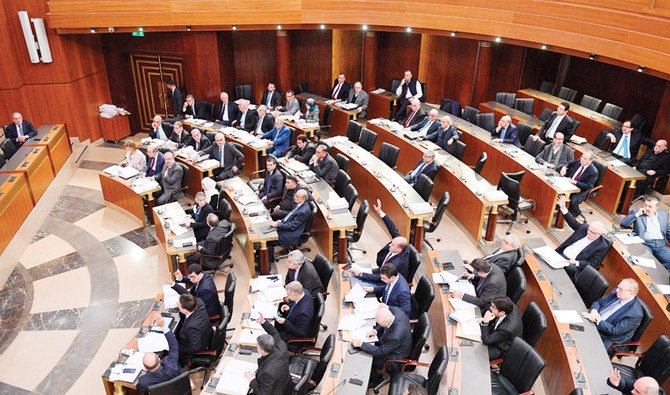
- ARAB NEWS
- 12 Jul 2025

Najia Al-Houssari
BEIRUT: The Lebanese parliament approved the country’s 2020 budget on Monday, in an unprecedented session that revealed the true extent of the state of confusion in Beirut.
The governments of former Prime Minister Saad Hariri, which drafted the budget, and current Prime Minister Hassan Diab, did not attend the budget debate, with Diab stating his government had “not yet won the confidence of Parliament, and has no right to retrieve the draft budget to study and modify it.”
The session was attended by just 70 deputies out of its 128, and was boycotted by the deputies of the Lebanese Forces and the Phalange parties, and a number of independent members of Parliament (MPs).
Forty-nine MPs approved the budget, from the Hezbollah, Amal, and Free Patriotic Movement blocs and their allies. Thirteen MPs voted against it, including the Future Movement bloc, and eight abstained, including the Democratic Gathering bloc, which is loyal to Walid Jumblatt, leader of the Progressive Socialist Party.
The budget did not include any economic vision, but was limited to numbers. The head of the Parliamentary Finance and Budget Committee, Ibrahim Kanaan, said that it included “an estimate of resources and allocations of funds.”
The budget deficit reached $7.5 billion.
Lebanon is suffering from a decline in its resources and an economic recession as a result of the tight banking restrictions on money transfers in US dollars.
In his diagnosis of financial reality, MP Salim Saadeh said: “I studied the budget numbers and added the debt service at a value of 4 or 5 trillion Lebanese pounds (LBP), and added the electricity deficit at a value of LBP1.5 trillion. The deficit is around $7.5 billion, and gross domestic product deficit is 12.7 percent, which indicates that our situation is very bad.”
He added: “The destruction that hit Lebanon’s economy is caused by the banks, the Lebanese Central Bank and the state treasury. We have a capital control that is stricter than in communist countries, and we now have three different dollar exchange rates with banks, money exchange companies and people.”
Saadeh said that the state was “suffering from a deficit in the trade balance, the balance of payments, the budget, the current account, the dollar reserves in the central bank, economic activity and in the treasury’s ability to borrow. There is also a failure to reform in light of the presence of the protests on the streets and the inability to stabilize the exchange rate of the dollar after we convinced citizens that the price of LBP1,500 for the dollar was permanent.”
During their discussion of the draft budget, MPs made some amendments to it, such as abolishing a clause that exempted sects from the tax on donations. The reduction also included the allocations for nongovernmental organizations, and imposed control over loans and donations in accordance with the constitution-sensitive mechanism and the Public Accountancy Act.
Hezbollah objected to any additional increase in electricity service prices provided by generators to citizens.
Six state ministries were canceled in the draft budget because they were no longer present in the new government.
The number of speakers permitted to address the session was cut from 21 to six, due to security concerns surrounding Parliament. This led to the discussion of the draft budget and its approval within three hours, despite originally expected to take two days.
Outside, protesters and security forces clashed, with firecrackers and stones thrown at the barricades erected to prevent the storming of the session. The Corniche El-Mazraa road in Beirut was also blocked of, and security forces responded with rubber bullets and tear gas.
The Lebanese Red Cross declared four people had been wounded and taken to hospitals in the capital, with eight other minor injuries recorded.